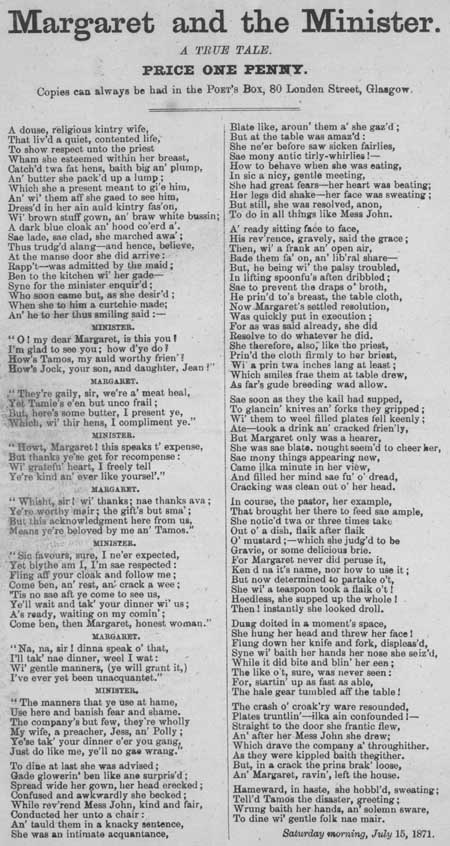Commentary
This ballad begins: 'A douse, religious kintry wife, / That liv'd a quiet, contented life, / To show respect unto the priest / Wham she esteemed within her breast'. It is dated 'Saturday morning, July 15, 1871'. A note under the title informs the reader that 'Copies can always be had in the POET'S BOX, 80 London Street, Glasgow'.
The Poet?s Box in Glasgow operated from 1849 to 1911. Matthew Leitch was the proprietor at 6 St. Andrew Lane?s, a narrow street on the south side of Gallowgate, from 1850 to 1858. His son William Munsie Leitch worked at the same address from 1859 to 1865 and at varous addresses in London Street until 1911. Many of the broadsides published by the Glasgow Poet?s Box were dated and some carried advertisements, not just for printed items but also for shoe blacking and ?soap for lovers?! Like the other ?boxes? in Dundee and Edinburgh, the Glasgow one sold love songs, sea shanties, parodies and dialogues. It is not clear what the connection between the different Poet?s Boxes were. They almost certainly sold each other?s sheets. It is known that John Sanderson in Edinburgh often wrote to the Leitches in Glasgow for songs and that later his brother Charles obtained copies of songs from the Dundee Poet?s Box. There was also a Poet?s Box in Belfast from 1846 to 1856 at the address of the printer James Moore, and one in Paisley in the early 1850s owned by William Anderson.
Part of this ballad takes the form of a dialogue between Margaret and the Minister. Upon arriving at the minister's house laden with gifts, Margaret is invited to stay for dinner. Anxious that she will show herself up in company, the minister finally persuades her to stay by suggesting she just follow his example at the dinner table. This kindly advice results in Margaret's humiliation, and the tale ends with her fleeing from the house. Whilst this humorous ballad would have proved entertaining for readers, it also offered a comment on the differences between the social classes - perhaps suggesting that never the twain should meet! Early ballads were dramatic or humorous narrative songs derived from folk culture that predated printing. Originally perpetuated by word of mouth, many ballads survive because they were recorded on broadsides. Musical notation was rarely printed, as tunes were usually established favourites. The term 'ballad' eventually applied more broadly to any kind of topical or popular verse.
View Transcription | Download PDF Facsimile
|
 |
Likely date of publication:
1871 shelfmark: RB.m.143(001)
 View larger image
View larger image
|


